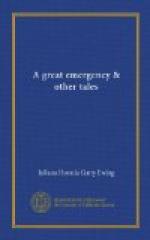“A lark,” he explained; “there was one singing its head off, this morning. I say, Dick, this will be a good field for a kite, won’t it? But wait a bit.”
After every fresh thing that Sandy showed us in our field, he always finished by saying, “Wait a bit"; and that was because there was always something else better still.
“There’s a brook at the bottom there,” he said, “with lots of fresh-water shrimps. I wonder whether they would boil red. But wait a bit. This hedge, you see, has got a very high bank, and it’s worn into kind of ledges. I think we could play at ‘shops’ there—but wait a bit.”
“It’s almost too good, Sandy dear!” said I, as we crossed the field to the opposite hedge.
“The best is to come,” said Sandy. “I’ve a very good mind not to let it out till to-morrow.” And to our distraction he sat down in the middle of the field, put his arms round his knees, as if we were playing at “Honey-pots,” and rocked himself backwards and forwards with a face of brimming satisfaction.
Neither Richard nor I would have been so mean as to explore on our own account, when the field was Sandy’s discovery, but we tried hard to persuade him to show us everything.
He had the most provoking way of laughing and holding his tongue, and he did that now, besides slowly turning all his pockets inside-out into his hands, and mumbling up the crumbs and odd currants, saying, “Guess!” between every mouthful.
But when there was not a crumb left in the seams of his pockets, Sandy turned them back, and jumping up, said—“One can only tell a secret once. It’s a hollow oak. Come along!”
He ran and we ran, to the other side of Our Field. I had read of hollow oaks, and seen pictures of them, and once I dreamed of one, with a witch inside, but we had never had one to play in. We were nearly wild with delight. It looked all solid from the field, but when we pushed behind, on the hedge side, there was the door, and I crept in, and it smelt of wood, and delicious damp. There could not be a more perfect castle, and though there were no windows in the sides, the light came in from the top, where the polypody hung over like a fringe. Sandy was quite right. It was the very best thing in Our Field.
Perronet was as fond of the field as we were. What he liked were the little birds. At least, I don’t know that he liked them, but they were what he chiefly attended to. I think he knew that it was our field, and thought he was the watch-dog of it, and whenever a bird settled down anywhere, he barked at it, and then it flew away, and he ran barking after it till he lost it; and by that time another had settled down, and then Perronet flew at him, and so on, all up and down the hedge. He never caught a bird, and never would let one sit down, if he could see it.




